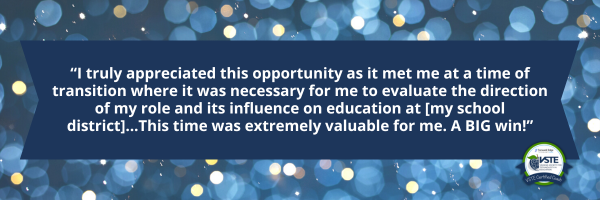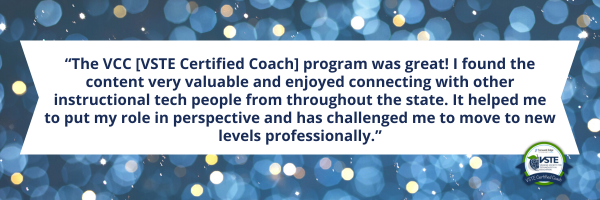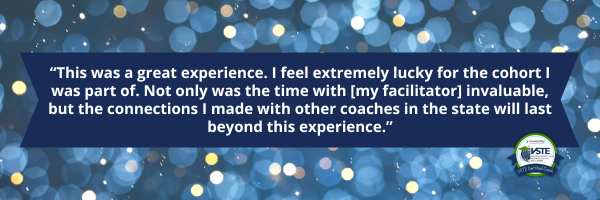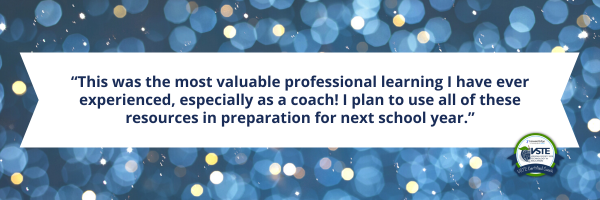70 Newly Certified Coaches Set To Impact Instruction This Fall

This time last year, we (myself and Dr. Katie Ritter) were just beginning to discuss what a Coach Certification program might look like with Rod Carnill (Executive Director) and Emily Heller (Board of Directors) through VSTE, Virginia Society of Technology in Education. One year later, this small passion project has turned into a multi-state program that is fundamentally changing the way that coaches impact instruction.

We first crossed paths with Emily Heller at the Future of Education Technology Conference in January 2022 and quickly discovered that we shared a passion for a widespread problem. Instructional coaching is the most effective form of professional development leading to classroom implementation1, yet the majority of instructional coaches receive little to no training specific to their coaching role.
To understand this strange contradiction, look at coaching through a different lens- Imagine hiring a first-year baseball head coach with the expectation that they take your team to state finals. You hired them because they were an incredible center-fielder. They know the position inside and out. They know the game of baseball inside and out. Now that they’re a coach, they SHOULD be able to use their experience to create a competitive team and ultimately make it to the state finals, right? Maybe….
Even though an athlete is a great player, they will need a specialized coaching skillset to change the behavior of other players to influence the team’s performance. They need to understand how players are motivated, create effective coach-player relationships, give constructive feedback, unite a team under a common vision, etc.
If we examine that same scenario in instructional coaching, we often find the same discrepancy between knowledge of the coaching subject (technology, math, literacy, etc) and an understanding of the coaching skillset. Often, we hire instructional coaches with the expectation that they transform what learning looks like at our school. We hire them because they are GREAT at their subject matter (i.e. literacy, math, technology). They are a great teacher. They SHOULD be able to use their experience to create other great teachers, right? Maybe…. But more than likely, they start the role lacking essential skills needed to be effective coaches.
What we have found through working with hundreds of instructional coaches, administrators, and teachers across the country is that coaching is a vastly different skill than teaching.
There is a unique skill set that an effective coach must possess in order to change adult human behavior.
Often, coaches are placed in their role because they were great teachers or great with technology (literacy/math instruction, etc), but are not afforded training on how to influence and change adult behavior. They have the technical expertise, but not the coaching skillset to transfer it to others.
This was the challenge that our partners at VSTE recognized as well. Through a shared passion for supporting the work of coaches, we created the VSTE Certified Coach Program, facilitated by Forward Edge.
Over a 5-month span (expedited cohort) and a 9-month span (annual cohort), coaches are organized into cohorts to engage in learning sessions and collaborative discussions specific to their coaching role. Coaches learn new strategies, implement them into their local coaching environment, and then regroup to discuss their experience, exchange ideas, and ultimately invest in a community that will serve them for years to come.

We knew there was a deep need for this work, but we were blown away by the response that quickly followed after the pilot cohort launched. In under a year’s time, Forward Edge’s Coach Certification program has been adopted by organizations in three states and will have supported 445 coaches by the end of 2023.
Not only is this program equipping coaches with the skills they need to impact instruction, but it is also preparing them to position themselves as assets for advancing their local schools’ strategic goals and initiatives.
We recognize that changing human behavior (instruction primarily) is only one side of a two-sided coin. To truly be effective agents of change, coaches must coach with a larger vision.
We believe that coaches are critical to the success of strategic plans and initiatives within a district. Throughout the Forward Edge Coach Certification programs, we have challenged coaches to align their work to the broader goals and plans of the schools they serve. We have supported technology coaches in advancing tier 1 instruction goals, special education coaches in advancing personalized learning goals, and literacy coaches in supporting equity & inclusion goals.

We are extremely thankful for the organizations that have partnered with us to bring Certified Coaching Cohorts to their membership this year. Our partners at VSTE, Rod Carnill and Emily Heller, and at MACUL, Mark Smith, have been an instrumental part of this shared vision and passion. We are looking forward to supporting more coaches in these organizations and more this coming fall.
Interested in bringing a Forward Edge Coach Certification program to your state? Contact Brooke Conklin (bconklin@forward-edge.net) to request more information about partnership opportunities.
1 Joyce, B., & Showers, B. (1982). The Coaching of Teaching. Educational Leadership
